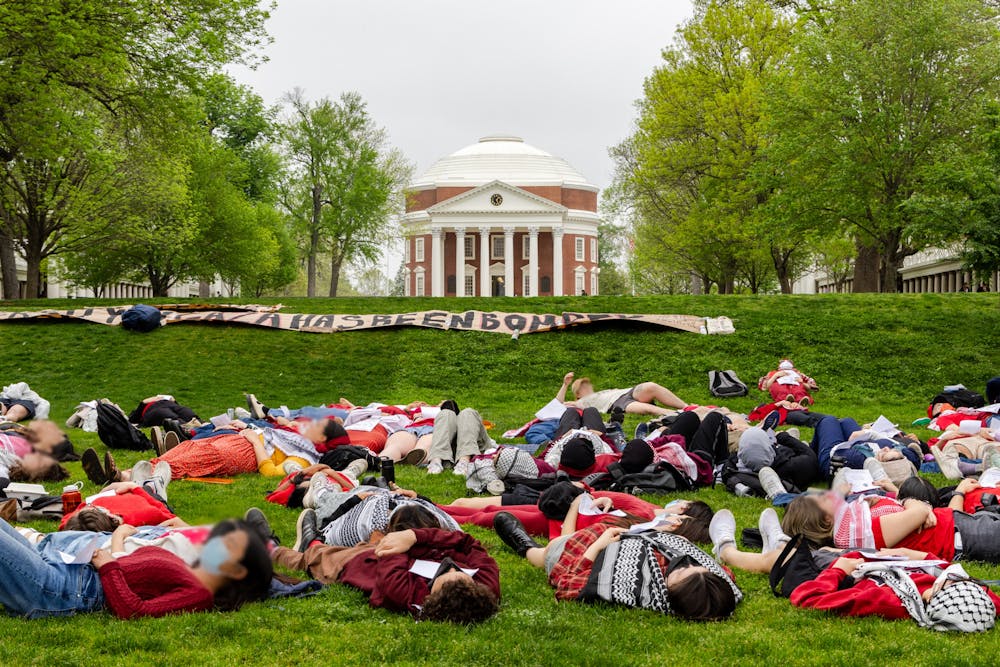Editor’s note: An initial version of this article was published without information about the number of people who attended this event. While no formal count is available, our reporters estimate that approximately 50 people were in attendance. The article has been updated to include this information.
As the final event of its Palestinian Liberation Week, Students for Justice in Palestine organized a die-in — a form of protest involving lying on the ground as if dead — on the Lawn Friday afternoon. The protest saw roughly 50 participants and consisted of a speech by Josh Rosenberg, SJP president and third-year College student, followed by the reading of the names of 65 killed Palestinians, all members of a single family. A moment of silence followed before all attendees read a poem together titled “If I Must Die” by Refaat Alareer, a Palestinian writer and poet who was killed in December by an Israeli airstrike.
A die-in is a form of protest where participants all lie down in a public setting, imitating dead bodies. On the national level, activists have hosted die-ins in the past to protest responses to the AIDS epidemic, as well as more recently following the 2020 murder of George Floyd.
Though die-ins are a form of protest, Rosenberg said the event was also planned as a way for students to reflect and mourn Palestinians killed by Israel amidst the ongoing war. According to Tedros Adhanom Ghebreyesus, director-general of the World Health Organization, over 30,000 Palestinians in Gaza have been killed during the war, with over 70,000 injured.
The die-in capped off Palestinian Liberation Week, which included educational and cultural events such as panels about healthcare in Gaza and a “Protest Poetry for Palestine” event, which was hosted in conjunction with the Asian Student Union and Flux Poetry & Spoken Word.
In his speech, Rosenberg spoke more broadly to the history of University students protesting human rights issues abroad, citing in particular activism against apartheid in South Africa that led the University to divest from the country.
“UVa. has a long tradition of anti apartheid activism,” Rosenberg said. “In 1990, after a decade of pressure from the Students Against Apartheid Coalition, U.Va. divested from South African apartheid. At a university that's mostly been on the wrong side of history, that's one of the few things we can be proud of.”
In this spring’s student elections, the U.Va Apartheid Divest Referendum called on the University to submit itself to an external audit of its investment portfolio and divest from any companies that profit from “human rights violations.” While only 30.43 percent of students at the University voted on the referendum, it passed with 67.87 percent of votes in favor.
At the March 1 meeting of the Board of Visitors, President Jim Ryan responded to the referendum’s passing, saying that were he a student, he would have voted against the referendum. Ryan also said that he does not believe that the University should take any political stance with its investment strategy. Though the referendum itself does not bind the University to any action, Rosenberg said he was unhappy with this response from Ryan.
“We think that our money not being invested in killing people is a pretty reasonable demand,” Rosenberg said. “We want to see tangible action from the administration that isn't Jim Ryan releasing a statement that says, ‘I would have voted no on this referendum’.”
Rosenberg also criticized some statements made by the Jewish Leadership Advisory Board, an elected group of Jewish student leaders associated with the Brody Jewish Center, in a letter sent to the Board of Visitors April 3 regarding antisemitism on Grounds. The letter supported Ryan and the administration’s response to antisemitism on Grounds, condemning people outside the University community for using Jewish students as “political pawns.”
The letter also reaffirmed the JLAB’s opposition to the referendum, which they referred to as “divisive and offensive.” Rosenberg said that despite JLAB’s condemnation of the Board of Visitors, JLAB continues to conflate anti-Zionism with antisemitism, which he said makes engaging in productive dialogue surrounding the ongoing conflict more difficult.
“This is a movement that is being led by Palestinian students and also Jewish students,” Rosenberg said. “It’s not something that’s antisemitic. It’s a call for human rights, and [the JLAB’s] continued conflation of antisemitism with anti-Zionism makes everyone less safe, and makes it so much harder to engage in good faith discourse, which is what they claim to support.”
Beyond the die-in, Rosenberg said that he has been happy with growing attendance at SJP events overall, adding that its recent events have not only seen large numbers of attendees, but many new faces. Najwa Labban, president of Medical Students for Palestine and Medical student, said she’s seen a similar increase in attendance at events in the School of Medicine pertaining to the ongoing conflict in Palestine.
“To be able to host events within the medical school and have it be attended by, at times, hundreds of medical students has been incredibly meaningful for me,” Labban said. “Because it means I'm providing those students a space when they need it the most and are being denied it by the leaders that are supposed to [provide it].”
Labban said that the School of Medicine has been antagonistic to student organizing and advocacy, creating a “hostile environment” that disproportionately affects minority students. She said she has faced disciplinary measures herself that she believes were meant to intimidate or silence her voice.
Though SJP has not announced any future events, Rosenberg said he hopes to engage in more visible forms of protest, including sitting in on administrative processes or even occupying space on Grounds for longer periods of time.







